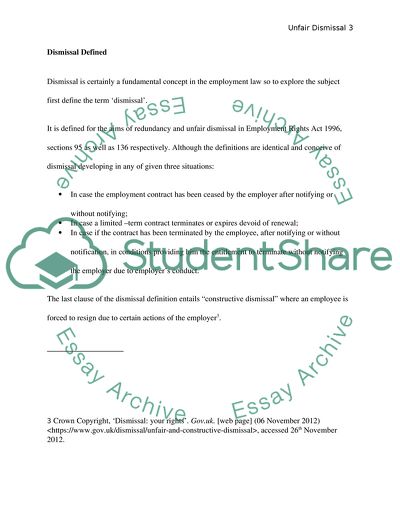Cite this document
(Give an historical account of the development of the law on unfair Essay, n.d.)
Give an historical account of the development of the law on unfair Essay. Retrieved from https://studentshare.org/law/1788238-give-an-historical-account-of-the-development-of-the-law-on-unfair-dismissal-up-to-the-present-day-this-will-include-reference-to-statute-and-government-proposals-and-a-selection-of-decided-cases-that-have-contributed-to-the-development-of-the-law-on-di
Give an historical account of the development of the law on unfair Essay. Retrieved from https://studentshare.org/law/1788238-give-an-historical-account-of-the-development-of-the-law-on-unfair-dismissal-up-to-the-present-day-this-will-include-reference-to-statute-and-government-proposals-and-a-selection-of-decided-cases-that-have-contributed-to-the-development-of-the-law-on-di
(Give an Historical Account of the Development of the Law on Unfair Essay)
Give an Historical Account of the Development of the Law on Unfair Essay. https://studentshare.org/law/1788238-give-an-historical-account-of-the-development-of-the-law-on-unfair-dismissal-up-to-the-present-day-this-will-include-reference-to-statute-and-government-proposals-and-a-selection-of-decided-cases-that-have-contributed-to-the-development-of-the-law-on-di.
Give an Historical Account of the Development of the Law on Unfair Essay. https://studentshare.org/law/1788238-give-an-historical-account-of-the-development-of-the-law-on-unfair-dismissal-up-to-the-present-day-this-will-include-reference-to-statute-and-government-proposals-and-a-selection-of-decided-cases-that-have-contributed-to-the-development-of-the-law-on-di.
“Give an Historical Account of the Development of the Law on Unfair Essay”. https://studentshare.org/law/1788238-give-an-historical-account-of-the-development-of-the-law-on-unfair-dismissal-up-to-the-present-day-this-will-include-reference-to-statute-and-government-proposals-and-a-selection-of-decided-cases-that-have-contributed-to-the-development-of-the-law-on-di.


